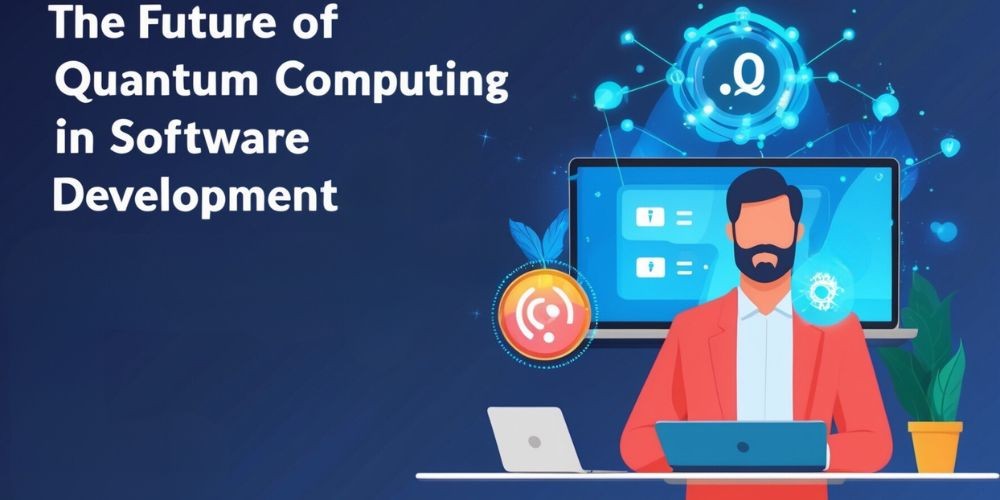The Future of Quantum Computing in Software Development: A New Frontier
- Jul 30, 2024
- 1244

The emergence of quantum computing marks a significant shift in technology, promising to surpass the capabilities of classical computing, which has driven innovation for decades. Classical computing, based on binary bits that represent either 0 or 1, is now being complemented by quantum computing, which leverages qubits. Qubits have the capability to exist in multiple states at the same time, thanks to the principles of quantum mechanics such as superposition and entanglement.
This unique characteristic opens up a myriad of new opportunities and challenges in software development. Let's explore how quantum computing is set to impact the future of software development, examining both its immense potential and the obstacles that need to be overcome.
New Horizons: Rewriting the Rules with Specialized Languages

The advent of quantum computing requires a radical departure from traditional programming methodologies. Existing languages and techniques designed for classical systems are inadequate for the quantum realm, necessitating the creation of specialized programming languages. Leading the charge in this new domain are languages like Microsoft's Q#, IBM's Qiskit, and Google's Cirq. These languages are specifically crafted to harness the unique capabilities of qubits and quantum algorithms.
These quantum-specific languages enable developers to construct and optimize quantum algorithms, making them crucial in the software development process for quantum systems. The integration of these new languages with established classical programming environments is essential. This integration opens the door to hybrid computing solutions, enabling quantum and classical systems to work in tandem and utilize their unique strengths to address intricate challenges.
To support this shift, robust development tools and environments are being rapidly developed. Quantum Development Kits (QDKs), quantum simulators, and debugging tools tailored for quantum code are becoming integral to the ecosystem. Additionally, libraries and frameworks designed to simplify the implementation of quantum algorithms are continually expanding. These innovations are not just technical aids but foundational elements that will define the efficiency and advancement of quantum software development.
Supercomputing Redefined: Unmatched Computational Capabilities

Quantum computing offers the potential to significantly accelerate problem-solving for certain types of problems. This enhancement is particularly impactful in fields such as cryptography, optimization, and machine learning.
For example, Shor's algorithm has shown that quantum computers can factor large numbers exponentially more quickly than classical computers. This capability poses a significant challenge for current cryptographic systems, many of which rely on the difficulty of factoring large numbers for security. This necessitates a shift towards quantum-resistant encryption methods, which are already a hotbed of research and innovation.
Optimization problems stand to benefit substantially from quantum advancements. Quantum algorithms promise solutions to complex logistical and scheduling problems currently beyond the reach of classical methods. In machine learning, quantum enhancements can lead to reduced training times and increasingly sophisticated models—transformative progress for industries that rely heavily on AI.
Overcoming Hurdles: Challenges in Quantum Integration
The journey to integrate quantum computing into mainstream software development is replete with challenges. One of the foremost is the current state of quantum hardware. Quantum processors still face significant issues related to qubit coherence, error rates, and scalability. Ensuring that these processors maintain stable quantum states and perform error-free computations over extended periods remains a central focus of ongoing research.

Quantum programming is inherently complex, and deeply intertwined with the principles of quantum mechanics. This complexity represents a steep learning curve for developers accustomed to classical programming paradigms. There is a pressing need for educational resources and training programs tailored to bridge this knowledge gap. Educational institutions are actively revising their curricula to incorporate quantum computing principles.
Moreover, integrating quantum and classical systems presents additional obstacles. Effective hybrid computing models depend on seamless communication protocols between quantum and classical processors, an area still under intensive study. The development of robust and efficient algorithms that enable these two types of processors to work together is critical to realizing the full potential of hybrid computing models.
Building the Future: Education and Collaboration
As quantum computing technology advances, its influence on the software development field will grow significantly. Developers will have to learn new skills and adopt new programming paradigms that utilize the distinctive features of quantum computing.
Educational institutions are tasked with evolving their curricula to encompass quantum computing, preparing the next generation of developers for this technological shift. This evolution involves integrating foundational quantum mechanics with practical quantum programming exercises, ensuring students gain both theoretical and practical competencies.

Collaboration between academia, industry, and government entities is essential for advancing quantum computing technology and addressing the associated challenges. These partnerships foster innovation, facilitate resource sharing, and streamline the development of robust quantum infrastructure. Strategic investments in research and development are crucial, accelerating the transition of quantum computing from theoretical potential to practical application.
Training programs and specialized educational platforms, such as CodeMonkey, also play a vital role. CodeMonkey, with its interactive and challenge-based learning approach, offers an accessible pathway for mastering coding fundamentals—a foundation crucial for those venturing into the quantum computing domain.
Charting the Course: Prospects and Potential
The evolution of quantum computing promises to redefine the landscape of software development. This transition is set to usher in an era of exponentially enhanced computational power, enabling solutions to problems that currently remain intractable.

As this revolutionary technology advances, continuous learning and adaptation will be vital. Developers will need to remain agile, embracing new paradigms and forging innovative applications of quantum computing. The horizon brims with potential, from groundbreaking advancements in fields like cryptography and AI to the optimization of highly complex systems, the possibilities are vast and transformative.
In conclusion, the advent of quantum computing signifies a pivotal moment in the field of software development. While the challenges are considerable, the potential benefits and advancements make it an endeavor of unparalleled importance. Collaboration between researchers, developers, and educators, coupled with strategic investments in quantum technology, will chart the course for this exciting future.
By understanding and leveraging the capabilities of quantum computing, we can unlock new dimensions of problem-solving and computational power, heralding a new frontier in the evolution of technology.